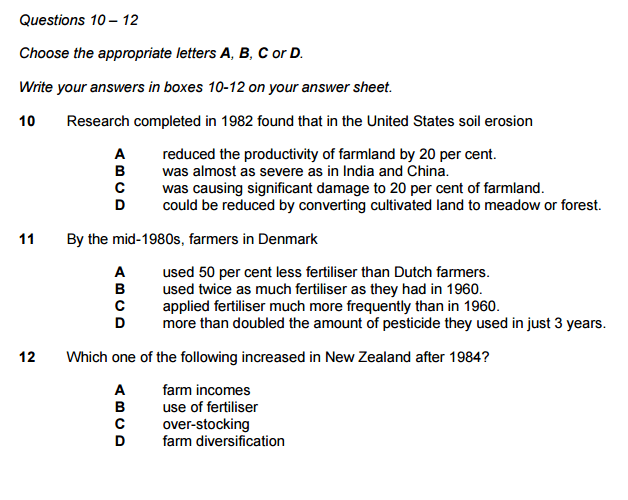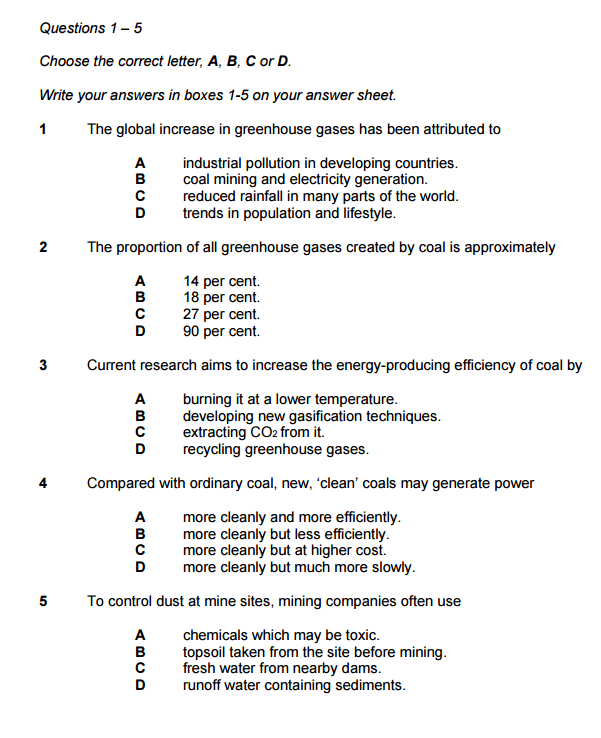This article will help you answer IELTS reading multiple choice questions more effectively.
On both the academic and general IELTS reading papers you are likely to be asked multiple choice questions (MCQs).
Your job is to simply choose the correct answer from a list of possible choices.
This post will:
- look at example questions
- discuss the reading skills required
- discuss common problems
- give you tips and advice
- provide you with a strategy to use on exam day
Example Questions
There are three different types of MCQ question. You will either have to:
- choose one answer out of four options
- choose two answers out of five options
- choose three answers out of six options
The first option is the most common.
You may also have two different question forms. Either:
- completing a sentence or
- answering a question.
Here is an example from the academic test:

Source: Cambridge English IELTS Past Papers.
In this example, you have to choose one answer from four possible options and the question requires you to complete the sentences.
Here is an example from the general paper:

Source: Cambridge English IELTS Past Papers.
Reading Skills
MCQs test your ability to understand the main ideas contained in a text and then look for specific information.
You will need to quickly identify the main idea in order to locate the correct section of the text.
When you do this it will seem like two or three of the options could be the correct answer and you, therefore, must read in much more detail to find the specific information that gives you the correct answer.
Common Problems
Reading the text before the questions– If you do this you are reading ‘blind’ because you are not sure what you are looking for. You also waste time because you will have to read the questions and then read the text again, so you have just wasted your time on the first reading.
Not answering questions– This seems like an obvious one but it would shock you how many people don’t answer the question at all.
Being tricked by the examiner– examiners love to try and trick you with ‘distractors’. Distractors are things that look like the correct answer but are actually incorrect. When you locate the correct section in the reading text, there will appear to be two or three plausible correct answers. A very common trick is matching lots of keywords from the question options to parts of the text. Just because there are lots of matching keywords doesn’t mean it is the correct answer. Also look at the context of the whole sentence and any qualifying words like most, all, always, sometimes.
Not reading the whole sentence– The first part of a sentence might look correct but the second half of it might change the meaning. Words like but and however can change the meaning of a whole sentence. Examiners know you are trying to get the answers as quickly as possible and will try to trick you in this way.
Not reading the text carefully– Because there are so many ‘distractors’, some of the ‘correct’ answers will appear to ‘jump out’ at you. If you don’t read the text carefully, you will choose the incorrect answer. Take some time to really understand the meaning of each sentence.
Top 10 Tips
- Read the questions before you read the text.
- You will often be able to eliminate 2 of the four answers and this leaves you with two choices. Think about the difference in meaning between these two choices and this will help you get the correct answers.
- If you are unsure of what the difference is between two or three sentences, it can help to rephrase them in your own words.
- If you are running out of time or you really don’t know the answer, have a guess. You will not lose marks for wrong answers and you have a 25% chance of getting the correct answer just by guessing.
- Don’t be tricked by the examiner’s ‘distractors’ especially keywords from the questions that look the same as the text.
- If you don’t know anything about the topic, don’t panic. It is a reading test, not a test of your knowledge.
- Try to predict the correct answer before you read the text. This will help you find the correct answer.
- Before deciding on your answer, always go back and carefully read the questions before making your final decision.
- The answers will be in the same order as the text.
- You might be asked about both facts and opinions. Facts are things that are always true or cannot be disproved but opinions are just what people think.
Strategy
This is my suggested strategy. There are many different strategies and you should use the one you feel comfortable with. You can also adapt this strategy to what suits you.
- Read the questions carefully.
- Skim the text to get the general meaning.
- Underline any keywords in the question and think about any synonyms that might appear in the text.
- Read the choices and underline any keywords. Think about the difference in meaning between the different choices.
- Predict the correct answer.
- Read the text and using keywords and synonyms locate the part containing the answers.
- Read that part of the text very carefully, thinking about the difference in meanings.
- Think about not only which options are correct but how the other options are wrong.
- Go back and read the question again and mark your final choice.
